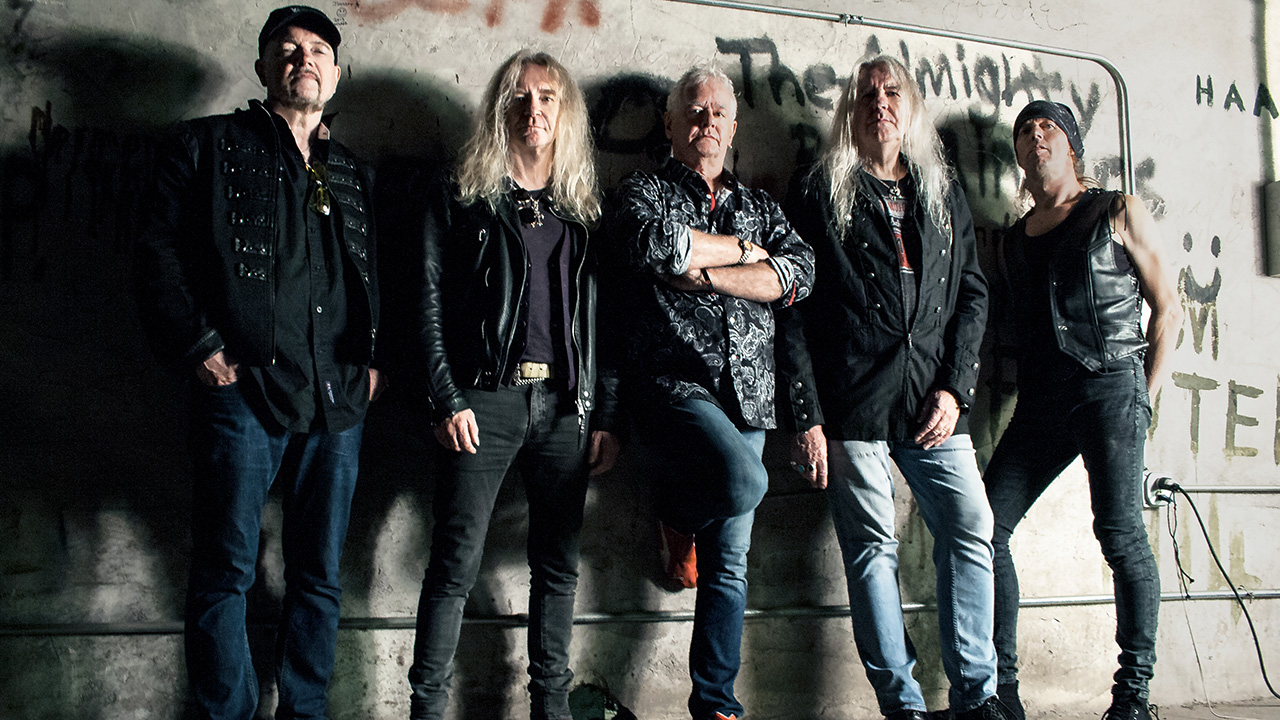With Saxon it’s always been about the riffs. During the band’s early years, in the early 80s, highly memorable guitar motifs cranked out by guitarists Paul Quinn and Graham Oliver provided the all-important first building blocks with which to construct tracks such as Wheels Of Steel, Strangers (747 Strangers In The Night), Princess Of The Night, And The Bands Played On and Denim And Leather.
In the mid-90s, riffs turned to rifts, and Oliver was replaced by Doug Scarratt (yes, it was that long ago). But the formula remained the same as the band stepped up and rediscovered their mojo. Although the process began towards the end of the 90s, it was the noughties in which Saxon carved out a late-career purple patch. Across the albums Killing Ground (2001), Lionheart (2004) and, more recently, Sacrifice (2013), hummable hooks and riffs have always been king.
“It’s especially true of this album,” lead singer Biff Byford announces by way of introduction to Carpe Diem, Saxon’s twelfth studio album (including last year’s covers collection Inspirations) with Scarratt, and there’s a definite note of pride in his voice.
“With this one I was on a crusade to bring back the riffs, and to make sure they were all great,” he continues, before emitting a dark chuckle: “I’m sure Paul and Doug hated me, but I wanted the guitar to be more at the forefront of it all.”
While that statement might suggest that Quinn and Scarratt email their latest ideas for Byford to patiently sift through, it’s not the case.
“Actually, Nibbs [Carter, bassist since 1988] is the one that provides recorded ideas,” says Byford. “Our guitar boys, Paul and Doug, both prefer to be in a band situation. They’re not as prolific – or as mad – as Nibbs, who sends me twenty guitar riffs, and I’ll pick maybe one or two. And then the following day there will be another fucking twenty” [laughs].
“But if we do use a Nibbs riff, then Paul and Doug will change it around and make it fit our style. It’s a strange process, but it always seems to work out well.”

However they managed it, Carpe Diem is among Saxon’s finest albums of their modern era. Yet it was constructed in the face of two specific hindrances. In September 2019 Byford was forced to undergo emergency triple-bypass heart surgery. He wrote some its lyrics while in a hospital bed, which could go some way towards explaining the brooding frustration that fuels their power.
“I was still doodling with the lyrics back then,” he explains, “though the actual songs were written earlier than that.”
And then came the pandemic. “Luckily, nobody in our family died, but lockdown was so boring, wasn’t it?” Byford sighs. “It comes to something when going shopping at Tesco is the high point of the week.”
The band had begun recording just as covid-19 slammed down the lid on most creative outlets, and were forced to finish it in various locations. Byford shares a production credit with Andy Sneap, the former Sabbat guitarist who also plays as a touring guitarist with Judas Priest.
Sneap, who has production credits with Megadeth, Opeth and Dream Theater, also did production work on Sacrifice. Here’s someone who knows how to make a dizbuster of a heavy metal record.
“He certainly does,” Byford says. “This one was made a bit differently, as we were not together [in the studio], but you can always rely on Andy. You know he will never scoop out the guitars and make us sound like Slipknot or somebody. We always want a certain sound.”
Carpe Diem was completed in the summer of 2020, during a hectic period in Byford’s life. Just a few months earlier the singer had released his debut solo album, School Of Hard Knocks. Also during lockdown, he made an album with his guitarist and vocalist son Seb under the handle Heavy Water. Nobody could accuse him of procrastination during those months of enforced home confinement.
“It was from the hospital bed that we [Saxon] had the idea of putting out a covers album [Inspirations] and delaying the release of Carpe Diem,” Byford says. “It just wasn’t the right time.”

Even for those who remember the band’s roller-coaster journey from to the halcyon days of the New Wave Of British Heavy Metal, it’s amazing to consider that Saxon have now released 23 studio albums.
“Yeah, that’s a lot isn’t it?” Byford says with a grin. “But we will have to do another one. I don’t like even numbers.”
After so many albums, is it sometimes tough to come up with fresh, new subject matter?
“It can be quite hard,” he acknowledges. “I’m always thinking about suitable words for titles and lyrics. The Pilgrimage, for instance, is a great one for Saxon. It made me sit down and think about what a pilgrimage actually means to people, which can be a lot of things. It’s far more than Chaucer’s Canterbury Tales. It can be about visiting Jim Morrison’s grave, or a battlefield in the Somme where their father or grandfather died. I love playing with words.”
Byford spends much of his free time researching the Boy’s Own-style subjects that Saxon have developed so many times before: real-life stories involving steam trains, Moon flights, Ancient Rome, motorcycles, aviation and, most tellingly, combat through the ages. “I do read quite a lot online once I have a basic idea for a song,” he explains. “That’s where Carpe Diem came from – I love the thought of ‘seizing the day’. I’m told that the Romans said that to one other on a regular basis. Its riff was one of Nibbs’s, by the way."
It’s scarcely believable that it took Saxon all of 42 years to come up with a song about the dam busters, one of the best and most inspiring tales from World War Two.
“Yeah, if anyone was going to write that one it would have been us or Iron Maiden,” Byford says with a laugh. “As a story it’s totally British.”
Despite being the subject of a 1955 blockbuster war film (and, according to some theories, inspired Gorge Lucas to dream up the mode of destruction of the Death Star in Star Wars), the story of engineer Barnes Wallace developing an ingenious ‘bouncing bomb’ to take out important targets of dams in Germany’s Ruhr valley in May 1943 is no longer universally known.
“I’ve done some interviews with German writers that asked: ‘Was ist Dambusters?’ And I needed to explain. People don’t talk much about it in Germany,” Byford deadpans, “but for us it’s perfect subject matter.”

As mentioned earlier, Byford might have an aversion to even numbers, but they’re all around him. Because of covid, Saxon’s 40th-anniversary tour Castles & Eagles morphed into a forty-second-anniversary tour that took place earlier this year, featuring the celebratory set first planned by the band.
After the postponements and the still ongoing pandemic, were there moments when he feared Saxon might never manage to return to the road?
“Not at all,” he says confidently. “That’s why we did Inspirations, to keep the band playing and recording together, and to buy us some time. I always believed there’d be an end to lockdown. Though it was frustrating, it never felt like Armageddon.”
The retirement of Krokus, the Swiss metalheads who were supposed to be touring with Saxon until the most recent postponement, meant they had to find a replacement. And management stablemates Uriah Heep were a perfect choice.
Following a slump in Saxon’s popularity during the 1990s, 2022 finds them back where they belong in terms of status. Once frontrunners of the NWOBHM, they lost valuable ground over the years, and eventually diverted their focus on to mainland Europe, which had stayed more faithful.
In 2007 they appeared on the British TV documentary series Get Your Act Together With Harvey Goldsmith, in which the Live Aid promoter attempted to revive the careers of six entertainment acts. Hindsight suggests that the band’s artistic trajectory would probably have restored Saxon’s status in the UK without their involvement in the show, which they now have regrets over.
“Making some great albums helped, but I don’t think that [the turnaround] can be attributed to one thing,” Byford muses. “It began with Solid Ball Of Rock [1990], which put us back on track after Destiny [1988]. The Harvey Goldsmith thing may have helped in some ways, but it also made us underdogs again. Most people’s reaction [to the show] was: ‘Why the fuck is he trying to change them?’ And I felt the same. But it did work on some levels. It made some fans wonder: ‘Why the fuck are they doing this? This is a great British band’, and they got behind us again.”
One thing’s for sure: Saxon’s hunger has never gone away. “Carpe Diem is an important album for us,” Byford declares proudly. “It’s the type of album that most heritage bands should be trying to make. It’s a big ‘fuck you’, and I know already that we will struggle to follow it. But we never relax and we always want to be better.”
In the face of such bravado it’s almost pointless to ask about retirement, but…
“How much more gas in the tank does Saxon have?” Byford ponders patiently, repeating the question. “Listen to the fucking record. None of us are content to sit back and go through the motions, either on stage or in the studio. We never accept second-best. The truth is that we haven’t even talked yet about calling it a day. Why should we? Covid makes things difficult to plan, but there are more gigs lined up for the UK in the autumn and we’ve at least one more album to make. Like I said, just listen to the fucking record.”

